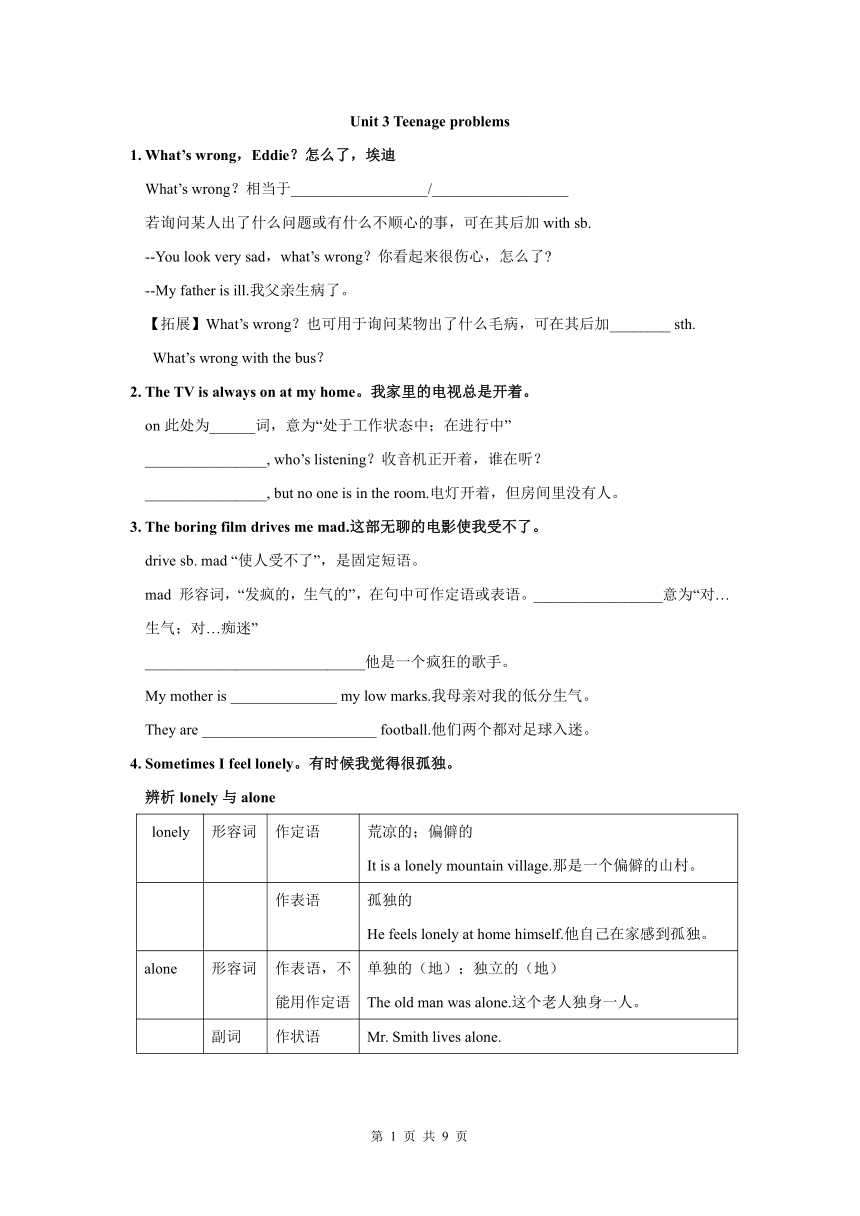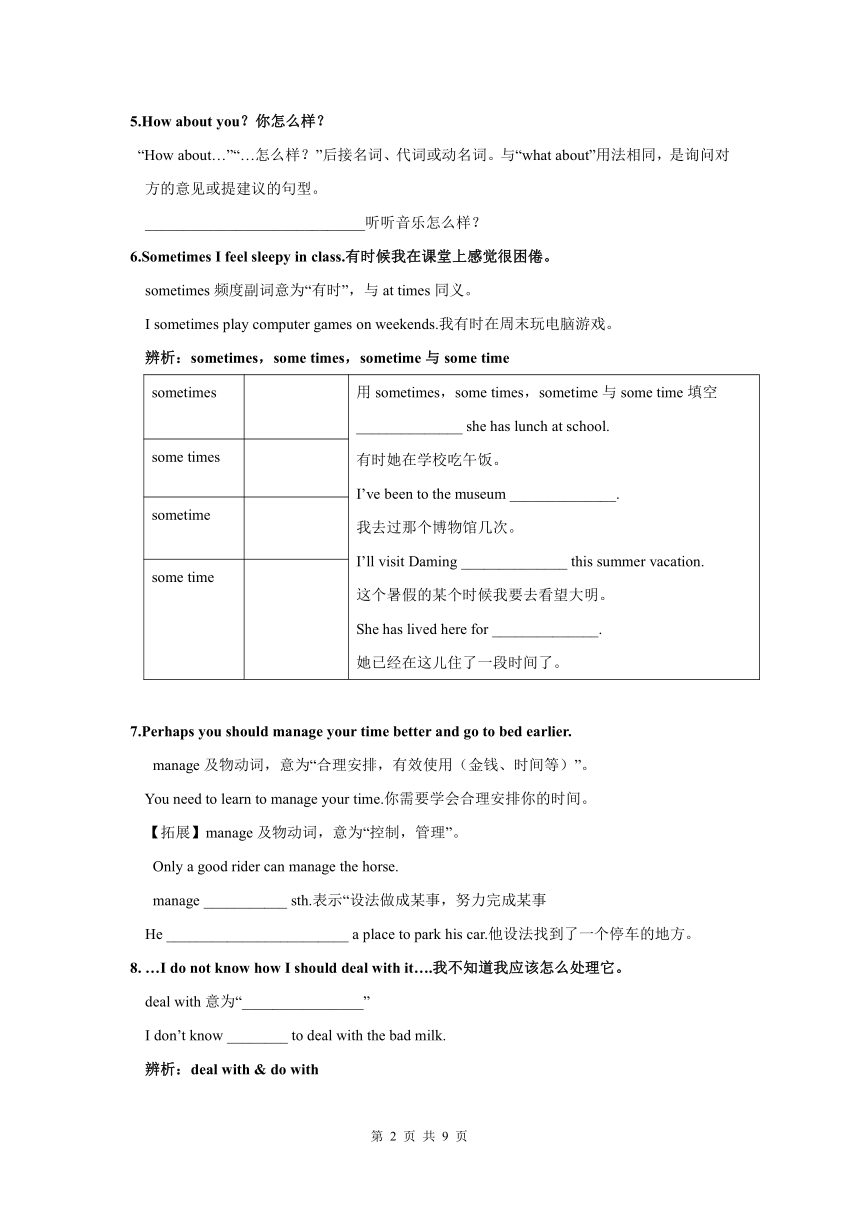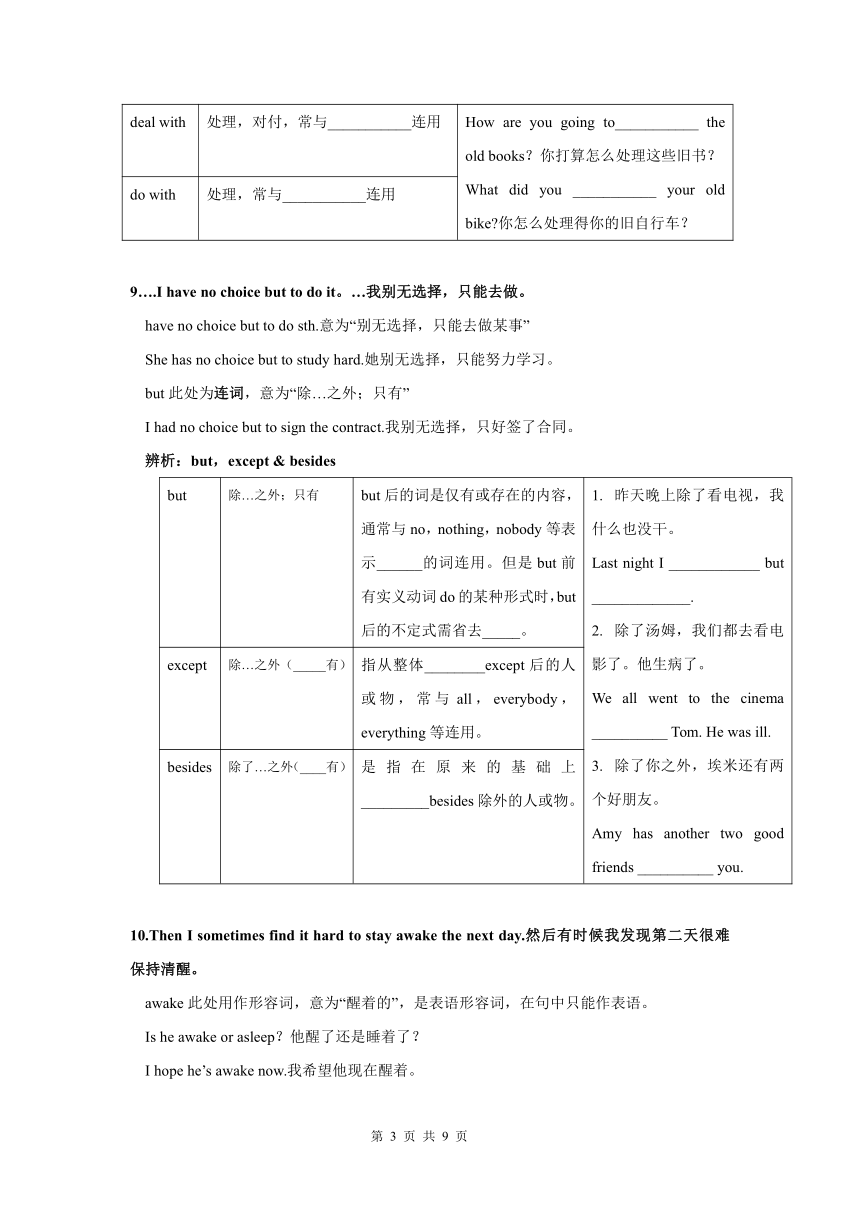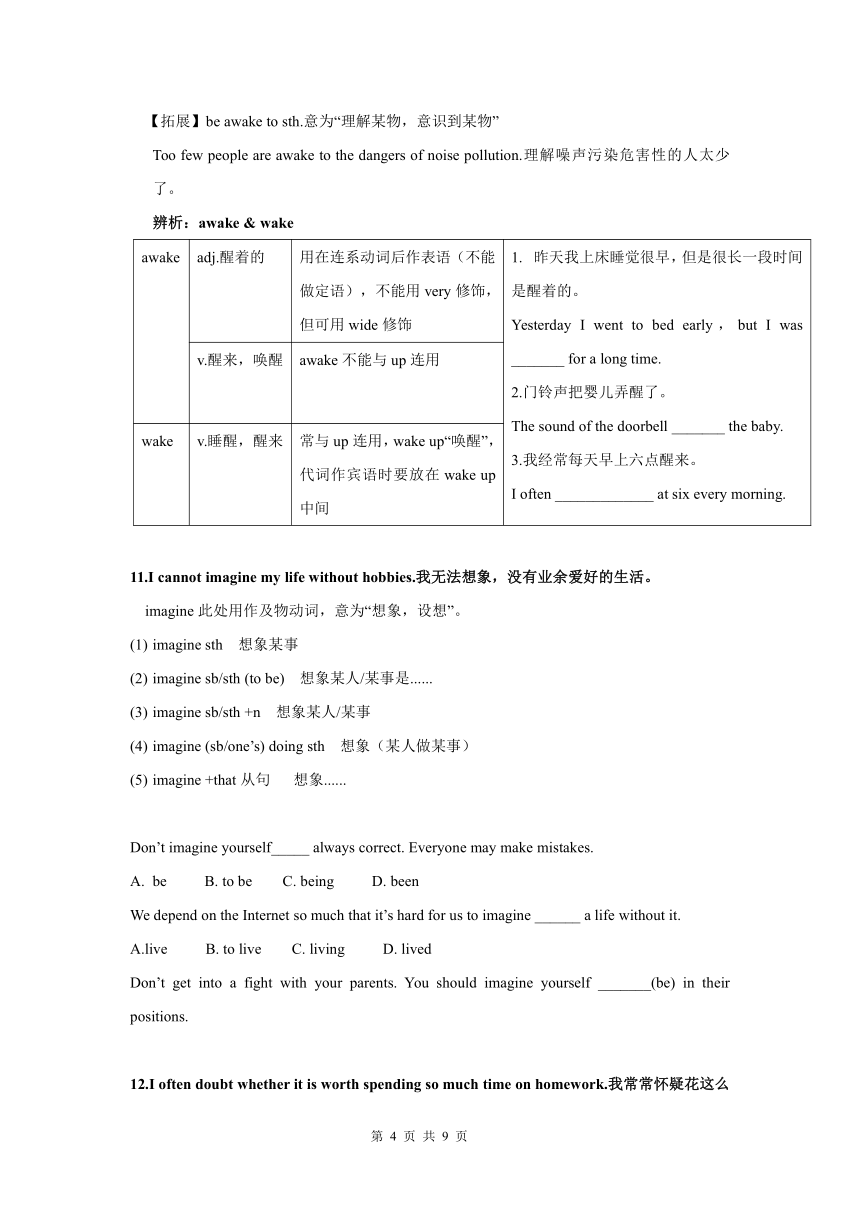牛津译林版英语九年级上Unit 3 Teenage problems单元知识点和宾语从句复习(含答案)
文档属性
| 名称 | 牛津译林版英语九年级上Unit 3 Teenage problems单元知识点和宾语从句复习(含答案) |

|
|
| 格式 | doc | ||
| 文件大小 | 120.0KB | ||
| 资源类型 | 教案 | ||
| 版本资源 | 牛津译林版 | ||
| 科目 | 英语 | ||
| 更新时间 | 2020-09-28 00:00:00 | ||
图片预览




文档简介
Unit 3 Teenage problems
1. What’s wrong,Eddie?怎么了,埃迪
What’s wrong?相当于__________________/__________________
若询问某人出了什么问题或有什么不顺心的事,可在其后加with sb.
--You look very sad,what’s wrong?你看起来很伤心,怎么了?
--My father is ill.我父亲生病了。
【拓展】What’s wrong?也可用于询问某物出了什么毛病,可在其后加________ sth.
What’s wrong with the bus?
2. The TV is always on at my home。我家里的电视总是开着。
on此处为______词,意为“处于工作状态中;在进行中”
________________, who’s listening?收音机正开着,谁在听?
________________, but no one is in the room.电灯开着,但房间里没有人。
3. The boring film drives me mad.这部无聊的电影使我受不了。
drive sb. mad “使人受不了”,是固定短语。
mad 形容词,“发疯的,生气的”,在句中可作定语或表语。_________________意为“对…生气;对…痴迷”
_____________________________他是一个疯狂的歌手。
My mother is ______________ my low marks.我母亲对我的低分生气。
They are _______________________ football.他们两个都对足球入迷。
4. Sometimes I feel lonely。有时候我觉得很孤独。
辨析lonely与alone
lonely 形容词 作定语 荒凉的;偏僻的
It is a lonely mountain village.那是一个偏僻的山村。
作表语 孤独的
He feels lonely at home himself.他自己在家感到孤独。
alone 形容词 作表语,不能用作定语 单独的(地);独立的(地)
The old man was alone.这个老人独身一人。
副词 作状语 Mr. Smith lives alone.
5.How about you?你怎么样?
“How about…”“…怎么样?”后接名词、代词或动名词。与“what about”用法相同,是询问对方的意见或提建议的句型。
_____________________________听听音乐怎么样?
6.Sometimes I feel sleepy in class.有时候我在课堂上感觉很困倦。
sometimes频度副词意为“有时”,与at times同义。
I sometimes play computer games on weekends.我有时在周末玩电脑游戏。
辨析:sometimes,some times,sometime与some time
sometimes
用sometimes,some times,sometime与some time填空
______________ she has lunch at school.
有时她在学校吃午饭。
I’ve been to the museum ______________.
我去过那个博物馆几次。
I’ll visit Daming ______________ this summer vacation.
这个暑假的某个时候我要去看望大明。
She has lived here for ______________.
她已经在这儿住了一段时间了。
some times
sometime
some time
7.Perhaps you should manage your time better and go to bed earlier.
manage及物动词,意为“合理安排,有效使用(金钱、时间等)”。
You need to learn to manage your time.你需要学会合理安排你的时间。
【拓展】manage及物动词,意为“控制,管理”。
Only a good rider can manage the horse.
manage ___________ sth.表示“设法做成某事,努力完成某事
He ________________________ a place to park his car.他设法找到了一个停车的地方。
8. …I do not know how I should deal with it….我不知道我应该怎么处理它。
deal with意为“________________”
I don’t know ________ to deal with the bad milk.
辨析:deal with & do with
deal with 处理,对付,常与___________连用 How are you going to___________ the old books?你打算怎么处理这些旧书?
What did you ___________ your old bike?你怎么处理得你的旧自行车?
do with 处理,常与___________连用
9….I have no choice but to do it。…我别无选择,只能去做。
have no choice but to do sth.意为“别无选择,只能去做某事”
She has no choice but to study hard.她别无选择,只能努力学习。
but此处为连词,意为“除…之外;只有”
I had no choice but to sign the contract.我别无选择,只好签了合同。
辨析:but,except & besides
but 除…之外;只有 but后的词是仅有或存在的内容,通常与no,nothing,nobody等表示______的词连用。但是but前有实义动词do的某种形式时,but后的不定式需省去_____。 昨天晚上除了看电视,我什么也没干。
Last night I ____________ but _____________.
除了汤姆,我们都去看电影了。他生病了。
We all went to the cinema __________ Tom. He was ill.
除了你之外,埃米还有两个好朋友。
Amy has another two good friends __________ you.
except 除…之外(_____有) 指从整体________except后的人或物,常与all,everybody,everything等连用。
besides 除了…之外(____有) 是指在原来的基础上_________besides除外的人或物。
10.Then I sometimes find it hard to stay awake the next day.然后有时候我发现第二天很难保持清醒。
awake此处用作形容词,意为“醒着的”,是表语形容词,在句中只能作表语。
Is he awake or asleep?他醒了还是睡着了?
I hope he’s awake now.我希望他现在醒着。
【拓展】be awake to sth.意为“理解某物,意识到某物”
Too few people are awake to the dangers of noise pollution.理解噪声污染危害性的人太少了。
辨析:awake & wake
awake adj.醒着的 用在连系动词后作表语(不能做定语),不能用very修饰,但可用wide修饰 昨天我上床睡觉很早,但是很长一段时间是醒着的。
Yesterday I went to bed early,but I was _______ for a long time.
2 2.门铃声把婴儿弄醒了。
The sound of the doorbell _______ the baby.
3.我经常每天早上六点醒来。
I often _____________ at six every morning.
v.醒来,唤醒 awake不能与up连用
wake v.睡醒,醒来 常与up连用,wake up“唤醒”,代词作宾语时要放在wake up 中间
11.I cannot imagine my life without hobbies.我无法想象,没有业余爱好的生活。
imagine此处用作及物动词,意为“想象,设想”。
imagine sth 想象某事
imagine sb/sth (to be) 想象某人/某事是......
imagine sb/sth +n 想象某人/某事
imagine (sb/one’s) doing sth 想象(某人做某事)
imagine +that从句 想象......
Don’t imagine yourself_____ always correct. Everyone may make mistakes.
be B. to be C. being D. been
We depend on the Internet so much that it’s hard for us to imagine ______ a life without it.
A.live B. to live C. living D. lived
Don’t get into a fight with your parents. You should imagine yourself _______(be) in their positions.
12.I often doubt whether it is worth spending so much time on homework.我常常怀疑花这么多时间做家庭作业是否值得。
doubt此处为及物动词,意为“怀疑”。在肯定句中,doubt一般后接_______或_______引导的宾语从句。在疑问句和否定句中,doubt后接_________引导的宾语从句。
I doubt __________ I’ll be successful.我怀疑自己能否成功。
I don’t doubt ___________ he’ll come.他一定会来,我不怀疑。
【拓展】
1)doubt还可用作不及物动词,意为“怀疑”,常与_______或_______连用。
She doubts about everything.她对一切都怀疑。
2)doubt还可作名词,意为“怀疑”,常用短语有:
_________怀疑,未确定 _________无疑地,很可能
There is no doubt about something.某事毫无疑问。
worth的用法 be worth doing sth意为“值得做某事”,使用主动结构表被动意义。
be worth +价钱,意为“值多少钱”
be worth+名词,意为“值得某物”
The book is well ______________.这本书很值得读。
The camera is worth seven hundred dollars.这部相机值700美元。
spend…on sth.意为“在某事上花费…”
spend…doing sth.意为“花费…做某事”
He _______________________ the pencil.他花2元钱买了这支铅笔。
It’s nice of you to spend so much time_________________ your school.花费那么多时间领着我参观你的学校,你真好。
13.I dream of a long holiday so that I could have more time for my hobbies.我梦想有个长假好让我有更多的时间从事我的业余爱好。
dream of意为“梦想;想象”,有时也用dream about,其后接名词、代词或动词ing形式。
I ______________________________ the moon some day.我梦想有一天飞上月球。
Last night I ______________ my grandma.昨天晚上我梦到了我奶奶。
14.Can you offer me some suggestions?你能给我提供一些建议吗?
offer sb. sth.=offer sth. ______ sb.意为“给某人提供某物”
I can __________________________.我能给你提供一些吃的。
【拓展】
offer to do sth.意为“主动提出做某事”
He _________________ me __________ English.他提出帮我学英语。
15.I am crazy about football.我热衷于足球。
be crazy about意为“狂热于”,后跟名词、代词或动词ing形式。
The little boy ____________________________.这个小男孩迷上了玩电脑游戏。
16.However, my love of football has become the cause of my problem.然而,我对足球的热爱成为问题的原因。
cause此处为名词,意为“原因”
What’s the cause of her illness?她的病因是什么?
辨析:cause,reason与excuse
cause 起因 指引起某种结果的“原因”,后接介词of
reason 理由,原因 指决定做某事或采取某项行动的理由
excuse 辩解,接口 指对某种行为所做的解释,可能是真的,也可能是托词
The cause of the fire was carelessness.火灾的起因是粗心。
He didn’t come today. Do you know the reason?他今天没来,你知道原因吗?
That’s not a good excuse.那不是个好借口。
Be
宾语从句复习
1. 宾语从句的引导词
宾语从句的引导词有三种:
that;2)whether/ if;3)特殊疑问词what/ when/ where/ who等。
例如:
(1) 以that引导的宾语从句:
that引导的宾语从句一般都是由陈述句充当,引导词that没有实际意义,不在从句中作任何成分,that可以省略,而且从句成分齐全,句意完整。
(2) 以whether或if引导的宾语从句:
从属连词if, whether引导的名词从句是由一般疑问句或选择疑问句转化而来的,变成从句后,语序由原来的倒装语序变成陈述语序。whether和if意为“是否”。
注意:
以下情况一般只用whether不用if。
1) 接带to的动词不定式。
2)与or not连用时。
3)作介词宾语时。
(3) 特殊疑问词what/ when/ where/ who等引导的宾语从句:
此类宾语从句原来是特殊疑问句,变成宾语从句后要用陈述语序,由wh-开头的疑问词引导。包括who, whom, whose, what, which等连接代词和where, when, how, why等连接副词,这些引导词有各自的意思,在从句中要作相应的成分,不能省略。
2. 宾语从句的语序
由whether/ if和特殊疑问词引导的宾语从句要用陈述语序
3. 宾语从句的时态对应
(1) 如果主句是一般现在时,宾语从句根据实际情况用各种时态。
(2)如果主句是一般过去时,宾语从句用相应的过去时态。
注意:如果宾语从句是表示客观真理和规律的句子时,用一般现在时。
4. 宾语从句的否定转移
主句如果是I think/ believe/ imagine/ suppose/ guess/ expect等,从句的否定一般要转移到主句中,其反意疑问句与从句一致。例如:
I don’t think they’ll wait to the last minute,will they?
我认为他们不会等到最后一分钟,他们会吗?
I don’t believe he did this, did he?
我相信他不会做这样的事,他会吗?
小题提优
单项选择
( C )1.She told me that the sun _________ in the east.
rise B. rose C. rises D.had risen
( B)2.Peter knew___________.
whether he has finished reading the book
why the boy had so many questions
there were 12 months in a year
when they will leave for Paris
( D )3.Let me tell you _____.
How much is the car B. how much does the car cost
C.how much did I pay for the car D.how much I spent on the car
( A )4.I can’t understand _____ the boy alone.
why she left B.why did she leave C.why she had left D.why had she left
( A)5.I don’t know ____ or not.
whether he is at home B.if he is at home C.that he is at home D.whether is he at home
( B )6.This depends on ____ the weather is free.
which B.whether C.if D.that
( A )7.The teacher asked the new student ____ class he was in.
which B.where C.if D.that
( B )8.I don’t know ____ Mr Green will come to see us. He’ll help us with our English.
why B.when C.how D.where
( A )9.--Be careful! Don’t break the bottles. Do you hear ___ I said., David?
---Yes, Mum.
what B.that C.why D.if
( C )10.--Do you know ___ Mr Black’s address is?
--He may live at No. 18 or No. 19 of Bridge Street. I’m not sure of____.
A.where, which B.where, what C.what, which D.what, where
将下面句子连接成为含有宾语从句的复合句。
These flowers are from Guangdong. He said.
He said ______ these flowers ______ from Guangdong.(that, were)
Light travels faster than sound. My teacher told me.
My teacher told me ______ light ______ faster than sound.(that travels)
There will be a meeting in five days. Jack didn’t know.
Jack didn’t know ______ there ______ ______ a meeting in five days.(if/whether, would be)
Can they speak French? I want to know.
I want to know ______ ______ ______ ______ French.(if/whether, they can speak)
根据句意,用括号中所给单词的正确形式或音标提示填空,每空一词。
One of my ______ (worry) is my mother’s illness. (worries)
What fine weather it is today! Shall we ______ (go) hiking? (go)
It’s time for CCTV news. Let’s ______ (turn) on the TV and watch it. (turn)
If you’re free tonight, how about ______ (have) dinner together? (having)
I feel strange about his ______ [?sa?l?nt], because he is outing. (silence)
第 1 页 共 9 页
1. What’s wrong,Eddie?怎么了,埃迪
What’s wrong?相当于__________________/__________________
若询问某人出了什么问题或有什么不顺心的事,可在其后加with sb.
--You look very sad,what’s wrong?你看起来很伤心,怎么了?
--My father is ill.我父亲生病了。
【拓展】What’s wrong?也可用于询问某物出了什么毛病,可在其后加________ sth.
What’s wrong with the bus?
2. The TV is always on at my home。我家里的电视总是开着。
on此处为______词,意为“处于工作状态中;在进行中”
________________, who’s listening?收音机正开着,谁在听?
________________, but no one is in the room.电灯开着,但房间里没有人。
3. The boring film drives me mad.这部无聊的电影使我受不了。
drive sb. mad “使人受不了”,是固定短语。
mad 形容词,“发疯的,生气的”,在句中可作定语或表语。_________________意为“对…生气;对…痴迷”
_____________________________他是一个疯狂的歌手。
My mother is ______________ my low marks.我母亲对我的低分生气。
They are _______________________ football.他们两个都对足球入迷。
4. Sometimes I feel lonely。有时候我觉得很孤独。
辨析lonely与alone
lonely 形容词 作定语 荒凉的;偏僻的
It is a lonely mountain village.那是一个偏僻的山村。
作表语 孤独的
He feels lonely at home himself.他自己在家感到孤独。
alone 形容词 作表语,不能用作定语 单独的(地);独立的(地)
The old man was alone.这个老人独身一人。
副词 作状语 Mr. Smith lives alone.
5.How about you?你怎么样?
“How about…”“…怎么样?”后接名词、代词或动名词。与“what about”用法相同,是询问对方的意见或提建议的句型。
_____________________________听听音乐怎么样?
6.Sometimes I feel sleepy in class.有时候我在课堂上感觉很困倦。
sometimes频度副词意为“有时”,与at times同义。
I sometimes play computer games on weekends.我有时在周末玩电脑游戏。
辨析:sometimes,some times,sometime与some time
sometimes
用sometimes,some times,sometime与some time填空
______________ she has lunch at school.
有时她在学校吃午饭。
I’ve been to the museum ______________.
我去过那个博物馆几次。
I’ll visit Daming ______________ this summer vacation.
这个暑假的某个时候我要去看望大明。
She has lived here for ______________.
她已经在这儿住了一段时间了。
some times
sometime
some time
7.Perhaps you should manage your time better and go to bed earlier.
manage及物动词,意为“合理安排,有效使用(金钱、时间等)”。
You need to learn to manage your time.你需要学会合理安排你的时间。
【拓展】manage及物动词,意为“控制,管理”。
Only a good rider can manage the horse.
manage ___________ sth.表示“设法做成某事,努力完成某事
He ________________________ a place to park his car.他设法找到了一个停车的地方。
8. …I do not know how I should deal with it….我不知道我应该怎么处理它。
deal with意为“________________”
I don’t know ________ to deal with the bad milk.
辨析:deal with & do with
deal with 处理,对付,常与___________连用 How are you going to___________ the old books?你打算怎么处理这些旧书?
What did you ___________ your old bike?你怎么处理得你的旧自行车?
do with 处理,常与___________连用
9….I have no choice but to do it。…我别无选择,只能去做。
have no choice but to do sth.意为“别无选择,只能去做某事”
She has no choice but to study hard.她别无选择,只能努力学习。
but此处为连词,意为“除…之外;只有”
I had no choice but to sign the contract.我别无选择,只好签了合同。
辨析:but,except & besides
but 除…之外;只有 but后的词是仅有或存在的内容,通常与no,nothing,nobody等表示______的词连用。但是but前有实义动词do的某种形式时,but后的不定式需省去_____。 昨天晚上除了看电视,我什么也没干。
Last night I ____________ but _____________.
除了汤姆,我们都去看电影了。他生病了。
We all went to the cinema __________ Tom. He was ill.
除了你之外,埃米还有两个好朋友。
Amy has another two good friends __________ you.
except 除…之外(_____有) 指从整体________except后的人或物,常与all,everybody,everything等连用。
besides 除了…之外(____有) 是指在原来的基础上_________besides除外的人或物。
10.Then I sometimes find it hard to stay awake the next day.然后有时候我发现第二天很难保持清醒。
awake此处用作形容词,意为“醒着的”,是表语形容词,在句中只能作表语。
Is he awake or asleep?他醒了还是睡着了?
I hope he’s awake now.我希望他现在醒着。
【拓展】be awake to sth.意为“理解某物,意识到某物”
Too few people are awake to the dangers of noise pollution.理解噪声污染危害性的人太少了。
辨析:awake & wake
awake adj.醒着的 用在连系动词后作表语(不能做定语),不能用very修饰,但可用wide修饰 昨天我上床睡觉很早,但是很长一段时间是醒着的。
Yesterday I went to bed early,but I was _______ for a long time.
2 2.门铃声把婴儿弄醒了。
The sound of the doorbell _______ the baby.
3.我经常每天早上六点醒来。
I often _____________ at six every morning.
v.醒来,唤醒 awake不能与up连用
wake v.睡醒,醒来 常与up连用,wake up“唤醒”,代词作宾语时要放在wake up 中间
11.I cannot imagine my life without hobbies.我无法想象,没有业余爱好的生活。
imagine此处用作及物动词,意为“想象,设想”。
imagine sth 想象某事
imagine sb/sth (to be) 想象某人/某事是......
imagine sb/sth +n 想象某人/某事
imagine (sb/one’s) doing sth 想象(某人做某事)
imagine +that从句 想象......
Don’t imagine yourself_____ always correct. Everyone may make mistakes.
be B. to be C. being D. been
We depend on the Internet so much that it’s hard for us to imagine ______ a life without it.
A.live B. to live C. living D. lived
Don’t get into a fight with your parents. You should imagine yourself _______(be) in their positions.
12.I often doubt whether it is worth spending so much time on homework.我常常怀疑花这么多时间做家庭作业是否值得。
doubt此处为及物动词,意为“怀疑”。在肯定句中,doubt一般后接_______或_______引导的宾语从句。在疑问句和否定句中,doubt后接_________引导的宾语从句。
I doubt __________ I’ll be successful.我怀疑自己能否成功。
I don’t doubt ___________ he’ll come.他一定会来,我不怀疑。
【拓展】
1)doubt还可用作不及物动词,意为“怀疑”,常与_______或_______连用。
She doubts about everything.她对一切都怀疑。
2)doubt还可作名词,意为“怀疑”,常用短语有:
_________怀疑,未确定 _________无疑地,很可能
There is no doubt about something.某事毫无疑问。
worth的用法 be worth doing sth意为“值得做某事”,使用主动结构表被动意义。
be worth +价钱,意为“值多少钱”
be worth+名词,意为“值得某物”
The book is well ______________.这本书很值得读。
The camera is worth seven hundred dollars.这部相机值700美元。
spend…on sth.意为“在某事上花费…”
spend…doing sth.意为“花费…做某事”
He _______________________ the pencil.他花2元钱买了这支铅笔。
It’s nice of you to spend so much time_________________ your school.花费那么多时间领着我参观你的学校,你真好。
13.I dream of a long holiday so that I could have more time for my hobbies.我梦想有个长假好让我有更多的时间从事我的业余爱好。
dream of意为“梦想;想象”,有时也用dream about,其后接名词、代词或动词ing形式。
I ______________________________ the moon some day.我梦想有一天飞上月球。
Last night I ______________ my grandma.昨天晚上我梦到了我奶奶。
14.Can you offer me some suggestions?你能给我提供一些建议吗?
offer sb. sth.=offer sth. ______ sb.意为“给某人提供某物”
I can __________________________.我能给你提供一些吃的。
【拓展】
offer to do sth.意为“主动提出做某事”
He _________________ me __________ English.他提出帮我学英语。
15.I am crazy about football.我热衷于足球。
be crazy about意为“狂热于”,后跟名词、代词或动词ing形式。
The little boy ____________________________.这个小男孩迷上了玩电脑游戏。
16.However, my love of football has become the cause of my problem.然而,我对足球的热爱成为问题的原因。
cause此处为名词,意为“原因”
What’s the cause of her illness?她的病因是什么?
辨析:cause,reason与excuse
cause 起因 指引起某种结果的“原因”,后接介词of
reason 理由,原因 指决定做某事或采取某项行动的理由
excuse 辩解,接口 指对某种行为所做的解释,可能是真的,也可能是托词
The cause of the fire was carelessness.火灾的起因是粗心。
He didn’t come today. Do you know the reason?他今天没来,你知道原因吗?
That’s not a good excuse.那不是个好借口。
Be
宾语从句复习
1. 宾语从句的引导词
宾语从句的引导词有三种:
that;2)whether/ if;3)特殊疑问词what/ when/ where/ who等。
例如:
(1) 以that引导的宾语从句:
that引导的宾语从句一般都是由陈述句充当,引导词that没有实际意义,不在从句中作任何成分,that可以省略,而且从句成分齐全,句意完整。
(2) 以whether或if引导的宾语从句:
从属连词if, whether引导的名词从句是由一般疑问句或选择疑问句转化而来的,变成从句后,语序由原来的倒装语序变成陈述语序。whether和if意为“是否”。
注意:
以下情况一般只用whether不用if。
1) 接带to的动词不定式。
2)与or not连用时。
3)作介词宾语时。
(3) 特殊疑问词what/ when/ where/ who等引导的宾语从句:
此类宾语从句原来是特殊疑问句,变成宾语从句后要用陈述语序,由wh-开头的疑问词引导。包括who, whom, whose, what, which等连接代词和where, when, how, why等连接副词,这些引导词有各自的意思,在从句中要作相应的成分,不能省略。
2. 宾语从句的语序
由whether/ if和特殊疑问词引导的宾语从句要用陈述语序
3. 宾语从句的时态对应
(1) 如果主句是一般现在时,宾语从句根据实际情况用各种时态。
(2)如果主句是一般过去时,宾语从句用相应的过去时态。
注意:如果宾语从句是表示客观真理和规律的句子时,用一般现在时。
4. 宾语从句的否定转移
主句如果是I think/ believe/ imagine/ suppose/ guess/ expect等,从句的否定一般要转移到主句中,其反意疑问句与从句一致。例如:
I don’t think they’ll wait to the last minute,will they?
我认为他们不会等到最后一分钟,他们会吗?
I don’t believe he did this, did he?
我相信他不会做这样的事,他会吗?
小题提优
单项选择
( C )1.She told me that the sun _________ in the east.
rise B. rose C. rises D.had risen
( B)2.Peter knew___________.
whether he has finished reading the book
why the boy had so many questions
there were 12 months in a year
when they will leave for Paris
( D )3.Let me tell you _____.
How much is the car B. how much does the car cost
C.how much did I pay for the car D.how much I spent on the car
( A )4.I can’t understand _____ the boy alone.
why she left B.why did she leave C.why she had left D.why had she left
( A)5.I don’t know ____ or not.
whether he is at home B.if he is at home C.that he is at home D.whether is he at home
( B )6.This depends on ____ the weather is free.
which B.whether C.if D.that
( A )7.The teacher asked the new student ____ class he was in.
which B.where C.if D.that
( B )8.I don’t know ____ Mr Green will come to see us. He’ll help us with our English.
why B.when C.how D.where
( A )9.--Be careful! Don’t break the bottles. Do you hear ___ I said., David?
---Yes, Mum.
what B.that C.why D.if
( C )10.--Do you know ___ Mr Black’s address is?
--He may live at No. 18 or No. 19 of Bridge Street. I’m not sure of____.
A.where, which B.where, what C.what, which D.what, where
将下面句子连接成为含有宾语从句的复合句。
These flowers are from Guangdong. He said.
He said ______ these flowers ______ from Guangdong.(that, were)
Light travels faster than sound. My teacher told me.
My teacher told me ______ light ______ faster than sound.(that travels)
There will be a meeting in five days. Jack didn’t know.
Jack didn’t know ______ there ______ ______ a meeting in five days.(if/whether, would be)
Can they speak French? I want to know.
I want to know ______ ______ ______ ______ French.(if/whether, they can speak)
根据句意,用括号中所给单词的正确形式或音标提示填空,每空一词。
One of my ______ (worry) is my mother’s illness. (worries)
What fine weather it is today! Shall we ______ (go) hiking? (go)
It’s time for CCTV news. Let’s ______ (turn) on the TV and watch it. (turn)
If you’re free tonight, how about ______ (have) dinner together? (having)
I feel strange about his ______ [?sa?l?nt], because he is outing. (silence)
第 1 页 共 9 页
